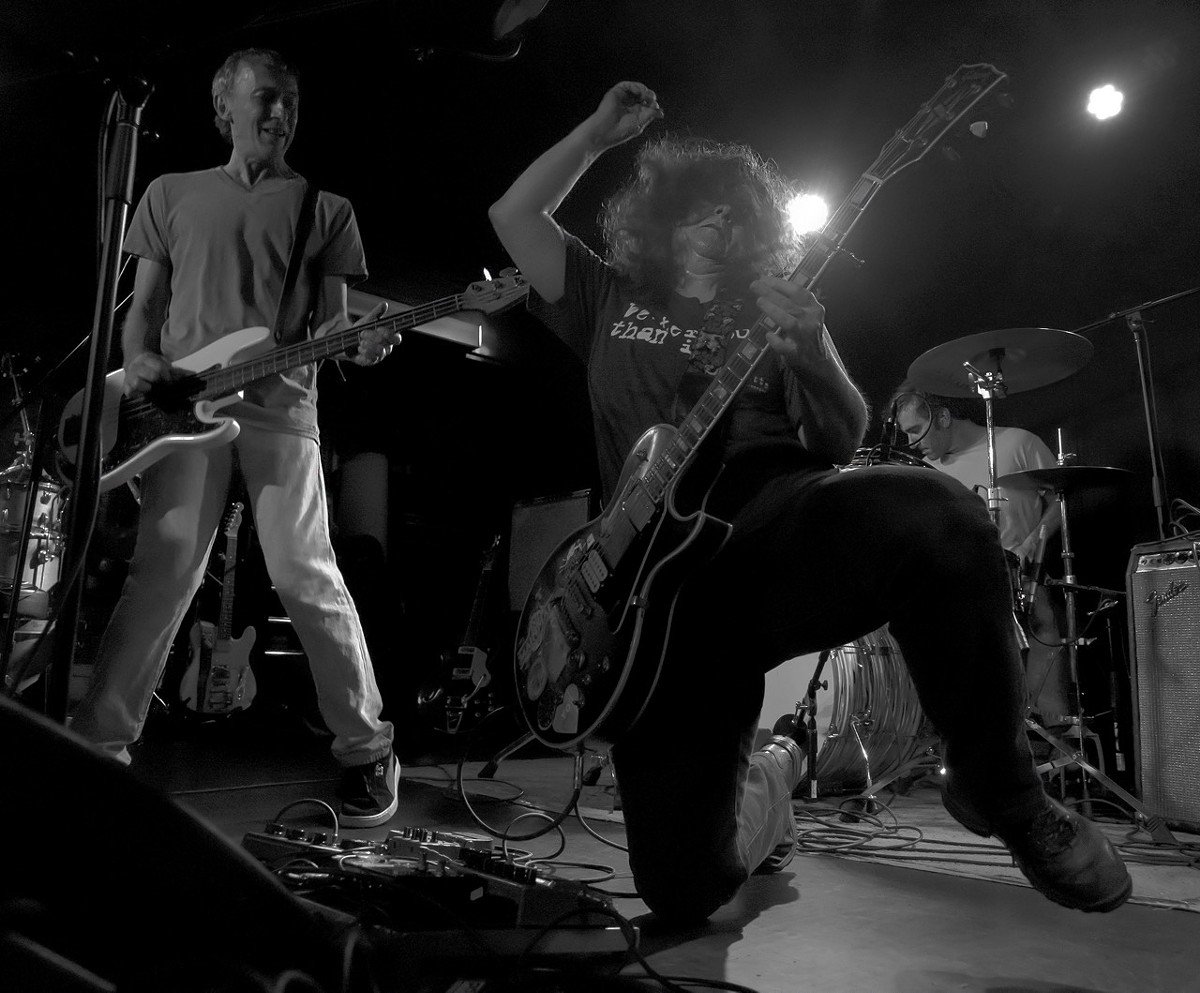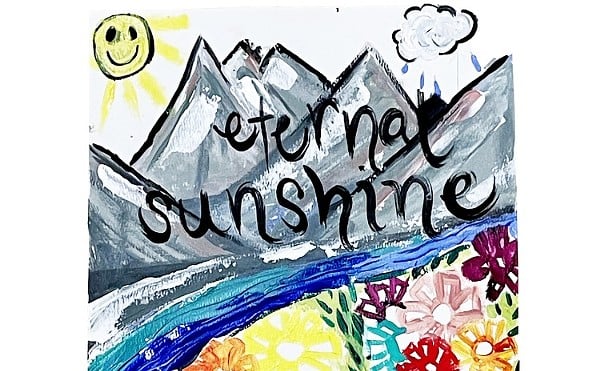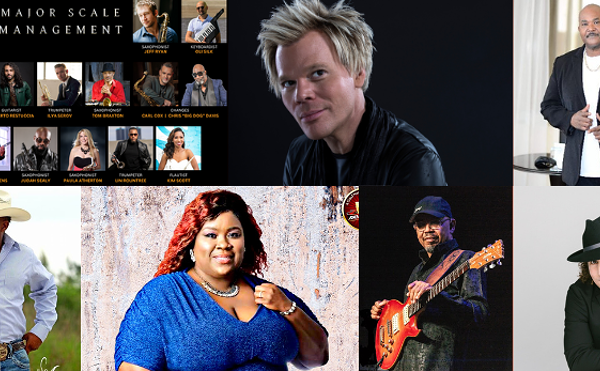While they formed in, and have always been, based out of New York City, indie rock veterans Antietam are one of the most Louisville bands of all time. This is, of course, due to husband and wife duo Tim Harris (bass/vocals) and Tara Key (vocals/guitars/keys) — both Louisville natives — who were two of the founding members of the Louisville punk scene back in 1978. First, Tara with her band No Fun, followed a few weeks later by Tim and the Babylon Dance Band, (which Tara would later join as well). Their style, sound, and songwriting were among the first cogs in creating the post-rock/post-hardcore style of music that came to be known as the “Louisville sound” by the early 1990’s, and their influence on the bands that popularized that sound cannot be overstated.
After moving East and getting married, Tara and Tim formed Antietam on Derby Day of 1984. The early years saw the band working with several other musicians, (including a few Louisville transplants from the early punk rock scene), before finding NYC native Josh Madell, who joined on drums in 1990 and has been with the band ever since. Now 40 years in, Antietam is making some of the best music of their career, as evident in their latest release — the four-song EP Pitch & Yaw, released in May of this year to celebrate the band’s anniversary. And while LEO didn’t have a chance to catch up with Tim and Tara in person, (they were on vacation in Italy at the time), we did get them to answer a whole slew of questions by email.
(This interview has been edited for length and clarity)
LEO: With bands like No Fun, Babylon Dance Band, The Endtables, The Blinders, and The I-Holes all forming within weeks of each other in 1978, was there a general consensus amongst everyone involved that all of you were going to jumpstart the Louisville punk scene, or did it all happen organically?
Tim Harris: I would say the latter. I don’t think anyone was really thinking about starting a scene, but a kind of magical spontaneous combustion blew up around town.
What we all shared was a Louisville recipe of a dedication to the craft of the composition and the performance on the one hand, and the desire to make something happen on the other.
In the beginning, we couldn’t really get gigs in conventional bars, so we performed in barns, the art school, galleries, the Teenage Pregnancy School, the women’s prison, the St. Matthews Potato Festival, a German beer hall, and our living room. There weren’t really rewards except each other’s attention. Any kind of job or career wasn’t even a possibility. Form a great band like the Endtables and you get to play in our living room!
We played little bars that would let us play because they didn’t really know what it was and because we asked politely. Then a bunch of punk rockers would show up at the Schooner in Portland or Willo’s on Oak Street, and eventually Dave and Marsha at the South 40 in Iroquois welcomed a repeated thing that became a scene.
For this interview, I jotted down the names of bands from that time, like the Dickbrains, Malignant Growth, Your Food, all early comrades on through Squirrel Bait, Kinghorse, Slint and Rodan. But when I got to 40 bands, I thought STOP! I better not name names - it’s just impossible not to leave somebody out. Where is Languid and Flaccid? Where is Orange Orange? There were so many good, interesting bands from Louisville.
Tara Key: It was never a conscious move. When Bruce [Witsiepe] and Tony [Pinotti] asked me to come jam with them and I left hours later with blood-covered hands and an exhilaration I had never felt before, I knew this [was] where I needed to be, and who I needed to be. But it was about self-fulfillment and not to spearhead a movement. We may have been first, but in a matter of weeks we had all joined together to be the authors of something bigger than us individually and it grew by snowball, not by design. That’s the great thing about Louisville - the music we made was not out of response to something and somewhere else, it was solely about where we were, who we were, and could have only been made right there and then.
Playing punk in Louisville in the late 70’s & early 80’s, was there ever trouble from people who saw you all as weird?
TH: The BDB played a gig in a barn. We tried to talk our way out of the gig, but the barn’s hostess insisted she liked punk rock. But her guests didn’t all share that. This guy started hassling us, saying “We don’t want to hear this shit.” When Chip [Nold] replied, “Don’t call my music shit,” this righteous aesthete punched him in the face. We considered a brawl, but not really being brawlers, we packed up and left.
Later, Chip and I mused about that incident, that, unlike some punks, we didn’t wear provocative clothes or safety pins, we didn’t act confrontationally or try to offend people, we just played this new music. We agreed that this raging maniac punched Chip for “purely aesthetic considerations.”
TK: Playing music in the first couple of years was often about cultural confrontation by default. There were not really places for us to play and we had to make a round peg fit a square hole. There was not the support of press or radio, so news of shows was spread by word of mouth and guerrilla-style posters plastered to telephone poles. But the BDB really didn’t view our music as provocative - I like to think that we were proselytizers for the positive possibilities of music as a bridge maker, not a bridge burner. We wanted to play in every neighborhood. We wanted to use our music as a conduit for breaking down class structure and geography, and, yes, Louisville was striated in those ways. We thought that if people listened, danced, and, most important, started their own bands, more could be found in common than in contrast and that would be a healthy thing. Rock and Roll evangelists that we were, our efforts did not always prove to be successful - at worst collision, and sometimes at best leading to head-scratching bewilderment on the part of the audience, and so we found ourselves in situations like Tim described. I can remember that barn party incident like it was yesterday, Tim and I instinctively backing Chip up with our guitars hoisted in the air ready for some El Kabong action. Being in a band felt like belonging to a platoon.
Not many bands that have been around 40 years or longer bother putting out new music, and when they do it’s usually uninspired and only to have something to tour on. However, the four songs on Pitch & Yaw sound fresh and driven, like they exist because you all truly needed them to exist. Where do you still find the inspiration to continue to create?
TH: That’s a good question and we are so gratified to hear you say that! As for where it comes from, I’m really not sure.
TK: Nor am I sure, but where the inspiration comes from feels more like the beginning days of our playing together than ever. The music comes because it needs to come. Songs demand our attention and care. Our guitars need us! I feel like we are making the best music of our lives by tuning out the white noise and tuning in the good noise that is an endless source of excitement and is the self-generating fuel to keep making said noise in new and beautiful ways.
What songs are you proudest of creating and why?
TH: “My Friend Roger” - Sean and I jammed out the riff, Tara did her first feedback magic, and Chip wrote my favorite lyrics ever. It just came together.
“Northern Star” - the first song on Tara’s [solo album] Bourbon County. I don’t even play on it. I’m a producer but Jon Williams of the Volcano Suns was really responsible for the sound at his cabin up in northern Vermont. Wolf [Knapp] played the bass, Ron Ward, later of Speedball Baby, the drums. It was a moment.
“Birdwatching” on IOI. I love playing rock music with Josh and Tara and that for me is the most ecstatic tune to lock in on.
And well, all four of the new ones on Pitch & Yaw.
TK: God, Tim, way to read my mind. I seriously named every one of those myself!
To elaborate: On “Roger” I took my first extended solo, and recorded feedback overdubs - the first overdubs ever by me.
On “Northern Star” I first added my surroundings to a recording. I played a propane tank next to the house with a big stick for an overdub. Those Vermont recordings were musical EST sessions. I learned to use the environment in recording; to let time and place be players on the record too. I did not make music in the same way after that.
On “Birdwatching” I felt like I had finally translated the helix of notes that live in my brain. And I realized my Stax horn-drenched fantasy thanks to the majesty of our friends in the Scenic Horns.
The new songs on Pitch & Yaw are really exciting for me. I hear a patience in each song that seems new. A deliberate telling of each tale rather than a breathless recounting of events. As the person who often throws a gazillion ideas at the wall while recording and then edits down, I purposely left space and breadth in the recordings where I may have tried to cram a lot in each box before. A little less Rauschenberg and a little more Zen. I look forward to expanding on that premise.
Any plans on coming back through Louisville anytime soon for a show?
TH: We last played Louisville in 2019 outside at Turners courtesy of Juanita. Tara Jane O’Neil was on the bill and Chip and Wink [O’Bannon] joined Antietam to play some BDB songs - the last time Wink graced a stage. It’s heartbreaking to think about that beautiful night on the Ohio River; Will Oldham dancing next to the stage with his baby in his arms, me afterward helping Wink and Teresa load up his amp. Then he died and we all made His Majesty’s Request, at first conceived by Tara to keep him alive.
TK: There are no current plans to play Louisville, but I would love to. Louisville shows are always extraordinary and, as evidenced by the Turners show, usually as laden with import as a rain swollen thundercloud. Or, perhaps, like a barrel of good vibe explosives. I hope I will always be allowed to maintain dual citizenship in NYC and Louisville. I follow every severe weather outbreak as if I live there. In fact, while mixing “Pitch & Yaw” (the song) on April 2 (which is about, in part, a vision of flying back in time to see my family all together in Shawnee Park), I had a split screen up on my phone of Marc Weinberg at WDRB and Ryan Hall tracking the severe weather. I was just as tense as if I was in my basement on Macmore Place in Crescent Hill or my front porch at 3208 Vermont.
Finally, you’ve been together since the Babylon Dance Band years and married for as long as Antietam has been going, what is the secret to your long relationship?
TH: We basically like to do the same things, except Tara doesn’t swim and I’m not on Facebook.
TK: I honestly could not have said it better!
For more on Antietam, check out the band’s website at www.antietamtheband.com, and get their latest EP - Pitch & Yaw, as well as all previous releases and merchandise at antietamnyc.bandcamp.com.





![[VLOG] The Metal Grind With Athena Prychodko (7/3/24)](https://media1.leoweekly.com/leoweekly/imager/vlog-the-metal-grind-with-athena-prychodko-7-3-24/u/golden-s/16539647/image-1.jpg?cb=1720031460)

